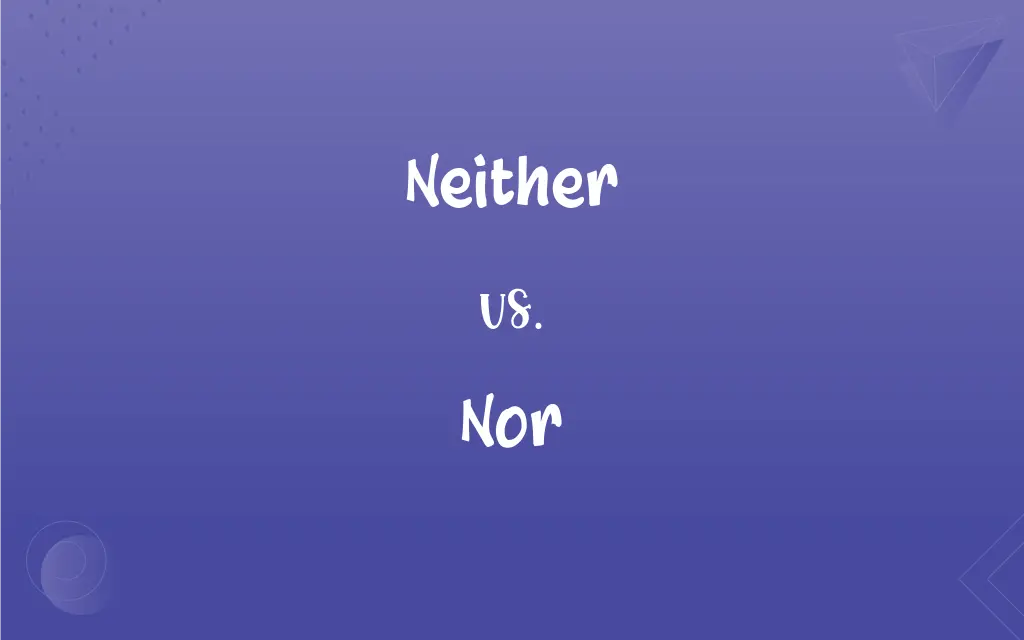Neither vs. Nor: What's the Difference?
Edited by Aimie Carlson || By Janet White || Published on January 2, 2024
Neither is used to deny two alternatives or possibilities. Nor is used to introduce a second negative element after 'neither' or 'not'.

Key Differences
Neither is employed to negate two options or elements simultaneously, indicating that both are not applicable or true. In contrast, nor is primarily used in conjunction with 'neither' or after a negative statement to introduce another negated element. While 'neither' initiates negation, 'nor' extends it to include an additional item.
The word neither can stand alone as a pronoun, conjunction, or adverb, negating a pair of alternatives. Nor, on the other hand, is a conjunction that cannot stand alone; it always follows 'neither,' 'not,' or another negative construction. 'Neither' starts a negation, and 'nor' follows to reinforce or add to the negation.
In usage, neither is often followed by 'nor' to form a correlative conjunction pair, but it can also be used independently. Nor, however, is dependent on a preceding negative context created by 'neither,' 'not,' or a similar negative word. 'Neither' can begin a sentence, whereas 'nor' typically cannot.
Neither can negate two subjects, objects, or ideas in a sentence, presenting a choice where both options are declined. Nor, when following 'neither,' negates the second of two options, but it can also follow a standalone negative statement to introduce an additional negated element.
The usage of neither can be more versatile, as it can be used in various parts of a sentence, whereas nor is strictly a conjunction used to connect two negative clauses. This distinction highlights 'neither's' flexibility in negating pairs of alternatives and 'nor's' specific role in continuing a negative sequence.
ADVERTISEMENT
Comparison Chart
Part of Speech
Can be a pronoun, conjunction, or adverb
Primarily a conjunction
Standalone Usage
Can be used independently
Dependent on a preceding negative element
Sentence Position
Can begin a sentence
Usually follows 'neither' or a negative statement
Function
Negates two alternatives or possibilities
Introduces an additional negated element
Dependency
Can operate without 'nor'
Generally follows 'neither' or a negative context
ADVERTISEMENT
Neither and Nor Definitions
Neither
Not the one nor the other of two people or things.
Neither option was appealing to her.
Nor
Used after a negative statement to add another negation.
She's not interested in music, nor does she like sports.
Neither
Used to introduce a further negative statement.
She neither knew nor cared about the news.
Nor
Following 'neither' to negate a second element.
Neither the teacher nor the students were ready.
Neither
Not either of two choices or possibilities.
Neither of the candidates was suitable.
Nor
Used to introduce a further negative element.
He can't sing, nor can he dance.
Neither
Indicates that the same negative statement applies to two subjects.
Neither the manager nor the assistant was available.
Nor
Reinforces a previous negation.
He didn't pass the test, nor did he try hard.
Neither
Used to reject two possibilities or choices.
Neither suggestion was practical.
Nor
Used to continue a negative series of statements.
It wasn't funny, nor was it intended to be.
Neither
Not one or the other; not either
Neither shoe feels comfortable.
Nor
And not; or not; not either
Has neither phoned nor written us.
Life forms that are neither plants nor animals.
Neither
Not either; not in either case. Used with the correlative conjunction nor
Neither we nor they want it. She neither called nor wrote. I got neither the gift nor the card.
FAQs
Can 'neither' be used without 'nor'?
Yes, 'neither' can function independently in a sentence.
Is 'nor' always used with 'neither'?
Often, but 'nor' can also follow other negative constructs.
Can 'neither' start a sentence?
Yes, it can begin a sentence to negate two options.
Is 'neither' only a conjunction?
No, it can also be a pronoun or adverb.
Does 'nor' have a role other than conjunction?
Primarily, it's used as a conjunction.
Can 'nor' stand alone in a sentence?
No, it needs a previous negative context.
Can 'nor' be used in positive statements?
No, it's exclusively for negative statements.
Can 'neither' function as an adverb?
Yes, it can modify verbs, adjectives, or other adverbs.
Does 'nor' always require a preceding negative?
Yes, it follows a negative word like 'neither' or 'not'.
Is 'neither' used for more than two options?
No, it's specifically for negating two choices.
Can 'neither' negate subjects in a sentence?
Yes, it can negate two subjects.
Can 'nor' link full sentences?
Yes, it can connect two negative sentences.
Can 'neither' be used in compound sentences?
Yes, it can link two negative clauses in a compound sentence.
Is 'neither' used in questions?
Yes, it can be used in questions to offer two negative choices.
Is 'neither' formal or informal?
It's neutral, suitable for both formal and informal contexts.
Do 'neither' and 'nor' always pair together?
Often, but not necessarily; 'neither' can be used alone.
Is 'nor' used in affirmative contexts?
No, it's used in negative contexts only.
Does 'nor' follow a specific structure?
Yes, it follows a negative structure or word.
Are 'neither' and 'nor' interchangeable?
No, they have distinct roles in negation.
Is 'nor' common in everyday speech?
It's less common in casual speech but used in formal writing.
About Author
Written by
Janet WhiteJanet White has been an esteemed writer and blogger for Difference Wiki. Holding a Master's degree in Science and Medical Journalism from the prestigious Boston University, she has consistently demonstrated her expertise and passion for her field. When she's not immersed in her work, Janet relishes her time exercising, delving into a good book, and cherishing moments with friends and family.
Edited by
Aimie CarlsonAimie Carlson, holding a master's degree in English literature, is a fervent English language enthusiast. She lends her writing talents to Difference Wiki, a prominent website that specializes in comparisons, offering readers insightful analyses that both captivate and inform.


































































